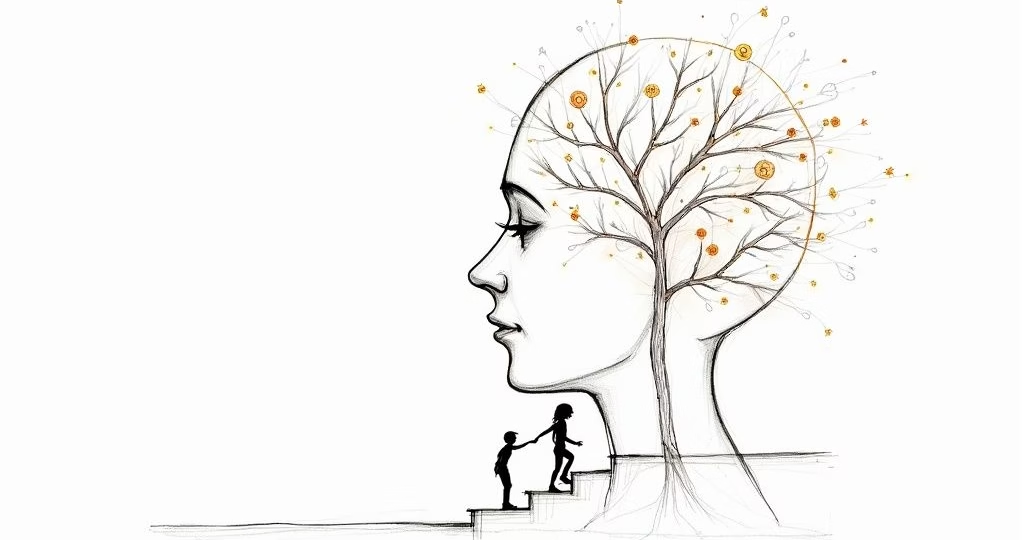What is Mindset Coaching? Unlock Your Full Potential Today
September 26, 2025 | by Andrespetrillo

Mindset coaching is a partnership that looks forward, not backward. It’s designed to help you build the mental frameworks you need to actually reach your goals.
Think of a mindset coach as a personal trainer for your brain. They guide you in shifting away from the limiting beliefs that hold you back and toward empowering ones that propel you forward. It’s all about building the mental strength to see challenges not as roadblocks, but as opportunities.
Unlocking Your Potential With Mindset Coaching
So, what is mindset coaching all about at its core? It’s the process of moving from a “fixed mindset” to a “growth mindset.”
A fixed mindset is the belief that your abilities, intelligence, and talents are static—that you’re born with what you’ve got, and that’s it. This perspective often leads to avoiding challenges and seeing any failure as a final verdict on your capabilities.
A growth mindset, on the other hand, is built on the belief that your skills can be developed through dedication and hard work. This view fosters incredible resilience, turning obstacles into some of your most valuable learning experiences.
The main goal of a mindset coach is to help you identify the subconscious stories holding you back and give you the tools to rewrite them. By digging in and challenging these internal narratives, you can unlock entirely new levels of performance and personal satisfaction. We explore this process more in our guide on overcoming limiting beliefs and rewriting your narrative.
This image does a great job of breaking down the core differences between these two powerful perspectives.
As you can see, a growth mindset embraces challenges and sees effort as the path to getting better, which is really the foundation of what we do in coaching.
How Is It Different From Therapy or Mentoring?
It's easy to get mindset coaching, therapy, and mentoring mixed up. While all three are geared toward supporting personal development, their focus and approach are quite different. It's a common point of confusion, so let's clear it up.
The table below offers a quick comparison to highlight the unique role of each.
Mindset Coaching vs Therapy vs Mentoring
| Aspect | Mindset Coaching | Therapy | Mentoring |
|---|---|---|---|
| Primary Focus | Future-oriented; achieving specific goals and building empowering beliefs. | Past-focused; healing trauma, processing emotions, and addressing clinical conditions. | Career/skill-focused; providing guidance and advice based on personal experience. |
| Approach | Action-driven; co-creates strategies with the client to move forward. | Diagnostic and healing; therapist is the clinical expert guiding recovery. | Advisory; mentor shares wisdom and offers a path to follow. |
| Goal | To unlock potential and create a desired future. | To resolve past issues and improve mental well-being. | To guide professional or personal development in a specific area. |
| Client Role | Active partner in their own growth and goal-setting. | Patient seeking to heal and understand past experiences. | Mentee seeking advice and a role model to learn from. |
Therapy often explores the past to heal trauma. Mentoring provides guidance based on a mentor’s own playbook in a specific field.
Mindset coaching, however, is all about the future and what you can do right now. It’s less about asking "why" things happened and much more about "how" you can create the future you actually want.
This forward-looking approach is a big reason why the coaching industry has seen such massive growth. The industry was recently estimated at around $6.25 billion and is projected to climb to $7.31 billion, with client satisfaction rates often soaring above 95%. People are seeing real, tangible results.
The Science Behind a Mindset Shift
Mindset coaching isn't just about "thinking positive" and hoping for the best. It's actually rooted in the science of how our brains work, specifically a principle called neuroplasticity.
Think of your brain like a grassy field. Every time you have a thought, you walk a path across that field. The more you repeat that thought—say, "I'm not good at this"—the more that path gets worn down, making it easier and more automatic to walk it again. Before you know it, you have a deep, muddy rut.
A mindset coach is like a guide who helps you forge new, more empowering paths. Through specific questions, exercises, and consistent practice, you start building fresh neural connections. Eventually, those new, positive, growth-oriented thoughts become your brain's default route. The first step is always learning to spot the old, subconscious patterns that have been holding you back.
Of course, your mental game is tied to your physical state. It's tough to build new pathways when you're running on empty. That's why understanding things like how sleep influences focus and cognitive well-being is so critical. Mental clarity and physical rest go hand-in-hand.
The Power of Reframing and Accountability
One of the most powerful tools a coach uses is called reframing. It’s about learning to change your perspective on a situation—seeing it not as a threat or a failure, but as a genuine opportunity to learn and grow.
For example, a teen who keeps procrastinating on their homework might see themselves as lazy. A coach helps them reframe that behavior. What if it isn't laziness at all, but a fear of not meeting expectations? That simple shift in perspective opens the door to building healthier, more effective study habits. It changes everything.
This is where accountability becomes a game-changer. A coach provides the structure and support to make sure you consistently practice these new ways of thinking until they stick. For teens, this kind of supportive structure can totally transform their academic motivation, and it’s a huge part of what we do in executive function coaching.
Accountability in coaching ensures that the insights you have in a session actually translate into real-world action. It closes that gap between knowing what you should do and actually doing it, turning good intentions into lasting change.
The coaching field is growing up, too. Recent data shows that 85% of active coaches have completed formal training, and 73% are women. It also turns out that coaches in specialized areas, like wellness, often earn up to 35% more, which shows just how much clients value getting targeted, specific results.
What a Typical Mindset Coaching Session Looks Like
A mindset coaching session isn't some stiff lecture where you get told what to do. It’s a dynamic, hands-on partnership. Think of it as a collaborative workshop where you’re building a clear roadmap for your own growth. While every session has a structure, it’s flexible enough to meet you exactly where you are, always kicking off with what’s on your mind right now.
We always start with a discovery phase. This is where you and your coach get on the same page, pinpointing the exact areas you want to work on. It could be anything from finally beating procrastination at school to building rock-solid confidence or just learning how to handle stress. This first step makes sure every conversation is intentional and gets you somewhere.
Uncovering Insights Through Questions
A good coach’s most powerful tool isn’t giving advice—it's asking really good questions. Instead of handing you answers, they guide you to find your own. Questions like, "What’s the one belief that’s really holding you back?" or "What would this feel like if it were easy?" are designed to gently challenge your old ways of thinking and open your mind to new possibilities.
This process of guided questioning helps you see your own thought patterns from the outside. For a lot of teens and young adults, this is a total game-changer, something we explored in our post about how life coaching transformed one teen’s perspective.
Building an Actionable Plan
Once you’ve had a few of those "aha!" moments, the focus shifts to creating a practical, real-world plan. Your coach will introduce you to proven techniques that are specifically chosen for what you're working on.
Here are a few tools we often use:
- Visualization Exercises to build confidence before a big exam or a nerve-wracking social event.
- SMART Goal-Setting to turn those vague dreams into clear, achievable steps you can actually take.
- Reframing Techniques to help you catch negative self-talk in its tracks and build genuine resilience.
A great session builds a bridge between self-discovery and real-world action. You don't just talk about changing; you leave with concrete things to do before your next meeting.
It’s clear this kind of support is in high demand. Mindset coaching is a huge part of the global wellness economy, which is valued at around $7 trillion. More specifically, the life coaching industry itself hit about $4.6 billion globally. This isn't just a fleeting trend; it’s a proven and dedicated practice for personal growth.
How Mindset Coaching Empowers Teens and Young Adults
The teenage years are a pressure cooker. You're juggling school, figuring out who you are, and trying to meet everyone's expectations all at once. It's a lot. Mindset coaching gives teens and young adults a space to build the mental tools they need to not just get by, but actually thrive.
It’s a forward-looking approach. Instead of getting stuck on challenges with school, procrastination, or motivation, we reframe them as opportunities for real, tangible growth.
This is especially helpful for teen boys and young men, who are often taught to bottle things up and avoid showing any vulnerability. Coaching creates a safe, judgment-free zone where they can build emotional intelligence, find healthy ways to cope, and learn to face life's hurdles with genuine confidence.
Actionable Tips for Parents
Parents, you're a huge part of this. Your support at home can amplify what happens in coaching sessions and help build a family culture where resilience is second nature.
Here are a few practical ways to foster a growth mindset:
- Praise Effort, Not Just Grades: Instead of saying, "You're so smart," try, "I saw how hard you worked on that project." This simple switch reinforces that abilities aren't fixed—they grow with dedication.
- Model Resilience: When you hit a roadblock, talk about it. Show your teen how you learn from mistakes instead of letting them define you. It teaches them that failure is just part of the process, not the end of the road.
- Encourage Healthy Risk-Taking: Support them in trying new things, even if they might not get it right the first time. This builds the courage they need to step outside their comfort zone and discover what they're capable of.
Resources for Teens and Young Men
Finding the right support system is everything. For anyone looking for structured communities and more guidance, there are some great resources designed specifically for young people.
A supportive environment is fundamental. Whether it's one-on-one coaching or a group setting, it’s what builds the self-awareness and resilience needed to navigate the complexities of modern life.
Organizations like The Jed Foundation and Active Minds offer fantastic mental health resources geared toward teens and college students. For young men, groups like The ManKind Project provide programs that help build emotional literacy and connection within a supportive community.
Sometimes, a more focused environment is needed. For those seeking intensive support, exploring something like a mental health retreat can be a powerful complement to coaching. These tools and communities create a strong foundation, reinforcing the positive changes made in coaching and setting the stage for long-term well-being.
A 5-Minute Meditation to Help Teens Find Focus
When school pressure, procrastination, and just general stress start to feel like too much, hitting the pause button for five minutes can change everything. Mindfulness isn't about somehow magically emptying your mind—that's impossible. It's about learning where to put your focus.
This quick meditation is designed to calm that buzzing, anxious feeling in your brain, sharpen your concentration for homework, and give you a real, practical tool you can pull out of your back pocket anytime, anywhere. Just a few minutes of intentional breathing can dial down your body's stress response, giving you the mental space you need to actually tackle that next assignment.
A Simple Guide for a Quick Reset
Follow these steps to get centered. You don’t need a special cushion or incense—just a quiet spot where you can be left alone for five minutes.
-
Find Your Spot: Sit down in a chair, let your feet rest flat on the floor, or just lie down. Gently close your eyes and let your hands relax in your lap.
-
Focus on Your Breath: Take a slow, deep breath in through your nose, and let it all out through your mouth. No need to force it. Just pay attention to the feeling of air filling you up and then leaving. That’s it.
-
Acknowledge Your Thoughts: Your mind is going to wander. 100% guaranteed. You'll think about homework, what a friend said, or what's for dinner. That's totally normal. When a thought shows up, just notice it without getting mad at yourself. Picture it like a cloud floating by in the sky, and then gently guide your focus right back to your breath.
-
Calming Visualization: Now, imagine a place that feels completely calm to you. It could be a quiet beach, a forest, or even just your own room feeling peaceful. Think about what you would see and hear. Spend the last minute or so just hanging out there, letting that feeling of calm wash over you.
This simple practice isn’t about doing it perfectly. It's about giving yourself a moment of intentional quiet, which is a seriously powerful skill for managing school, staying motivated, and handling whatever life throws at you.
Your Questions About Mindset Coaching Answered
Mindset coaching is a powerful idea, but it's normal to have questions. What is it, really? How does it differ from therapy? Can it actually help my kid who’s struggling with motivation? Let’s dive into some of the most common questions I get.
How Is Mindset Coaching Different From Therapy?
This is a big one. While both are incredible tools for personal growth, they operate differently.
Think of it like this: therapy often looks backward to heal, while coaching looks forward to build.
Therapy is a clinical practice designed to treat diagnosed mental health conditions and heal past trauma. It's an essential resource, and organizations like The Jed Foundation do critical work highlighting its importance for mental health challenges.
Mindset coaching, on the other hand, is all about the present and the future. It’s a partnership focused on helping you see the limiting beliefs holding you back, then actively working to create new thought patterns to reach specific goals. It's less about "why am I this way?" and more about "how can I move forward?"
Can Coaching Help With Motivation for School?
Absolutely. This is one of the most common reasons parents and teens come to me. When a student is procrastinating or just seems completely unmotivated, the instinct is often to tell them to "try harder." But that rarely works.
A mindset coach helps a teen dig deeper to find the real reason behind the lack of motivation. Is it a fear of failure? A belief that they're "bad at" a certain subject? Overwhelm?
Once we uncover that root belief, we can start to reframe it. Challenges become opportunities. Failure becomes a lesson. They learn practical, real-world strategies for managing their time and energy that actually work for them. The result is a natural, sustainable boost in motivation because they’re no longer fighting against their own mind.
Mindset coaching for teens isn't about fixing a problem; it's about building a skill set. It equips them with the resilience and self-awareness needed to handle academic pressure and take ownership of their success.
What Resources Exist for Teen Boys?
It's so important for teen boys and young men to have safe spaces where they can build emotional intelligence without judgment. One-on-one coaching provides that, but community support can be a game-changer, too.
Groups like The ManKind Project offer programs specifically designed to build emotional literacy and connection among men. These communities reinforce the ideas we work on in coaching—teaching young men that true strength includes vulnerability, self-awareness, and the courage to be open.
Are There Any Practical Tools for Stressed Teens?
Definitely. One of the simplest and most powerful tools I teach is mindfulness. It sounds small, but even five minutes of intentional breathing can make a world of difference when a teen feels crushed by school or social pressure.
A Quick 5-Minute Reset for Teens
- Find a comfortable spot: Sit or lie down somewhere you won't be bothered. Gently close your eyes.
- Focus on your breath: Don't try to change it. Just notice the feeling of your breath moving in and out of your body.
- Acknowledge thoughts: Your mind will wander. That's okay. When a thought pops up, just gently notice it without judgment and guide your focus back to your breath.
- Stay for five minutes: Set a gentle timer. This simple practice helps calm the nervous system and sharpens focus, making it easier to handle procrastination and stress.
This isn't just about relaxing—it's about building the mental muscle for greater emotional regulation.
At Andrew Petrillo Life Coaching, I specialize in helping teens and young adults build the mindset skills to conquer academic and personal challenges. If you're ready to see how a dedicated coach can make a real difference, let's connect.
You can learn more and book your complimentary discovery call at https://andrewpetrillolifecoaching.com.
RELATED POSTS
View all



